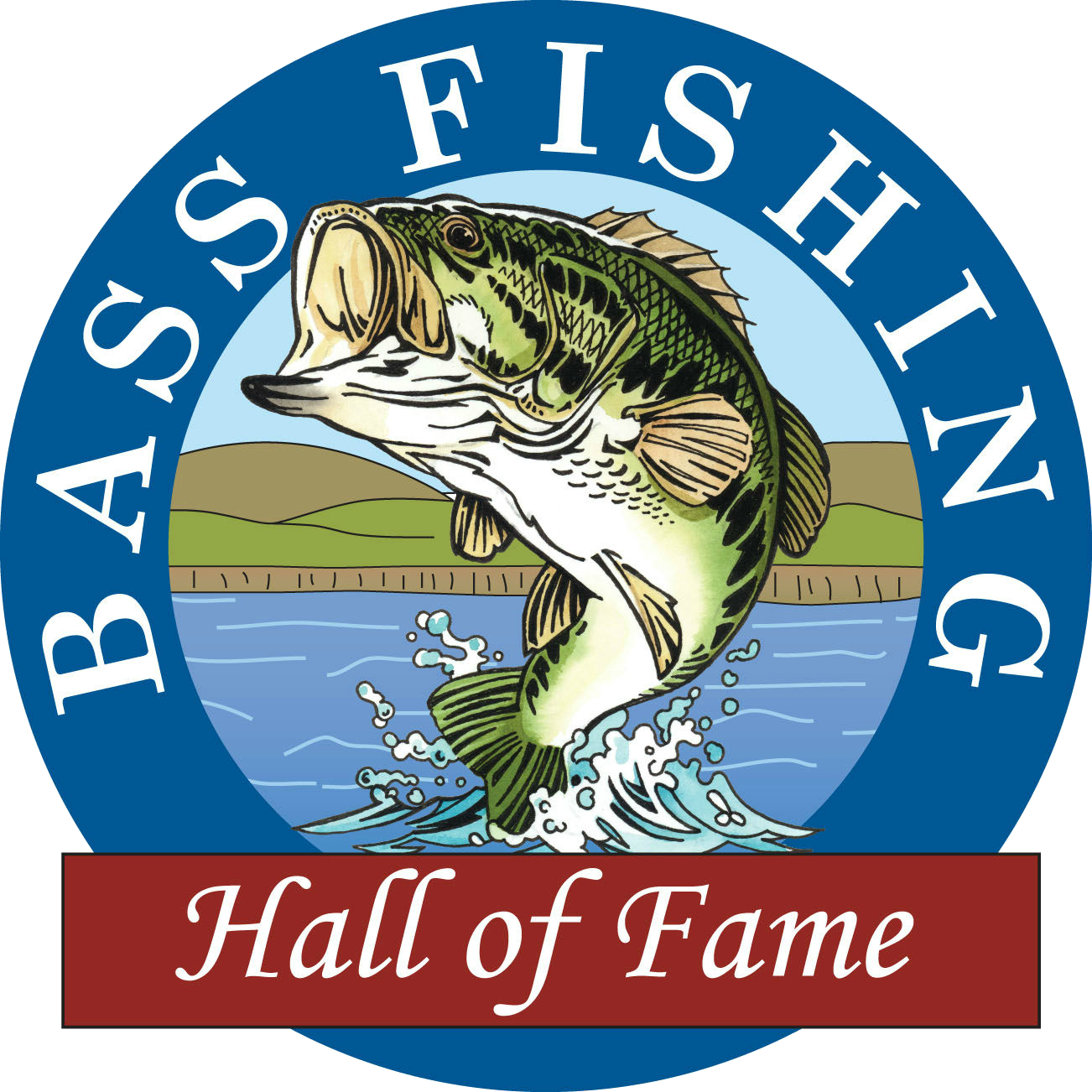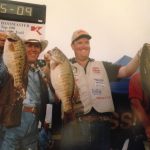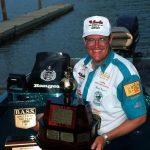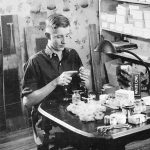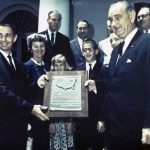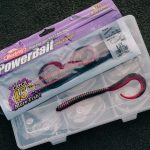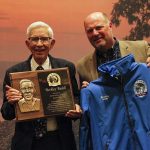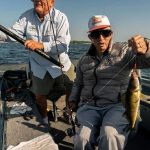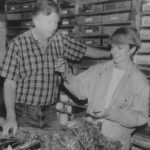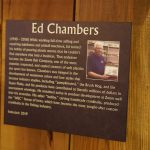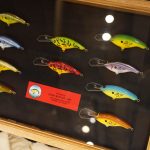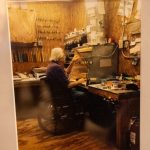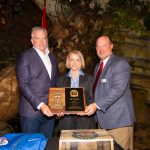Mark Davis
Mark Davis — Davis fished his first Bassmaster tournament at 23 years old, but by that point he’d been guiding on waters near his Arkansas home for a decade. He has continued to compete as a touring pro for more than three decades and has earned wins on multiple circuits. His three Bassmaster Angler of the Year titles put him in elite company, but he is best known for becoming the first pro to win the Bassmaster Classic and the AOY title in the same calendar year. That magical season earned him an invitation to the White House. His influence has been substantial on lure design and he has helped to popularize a number of products including the Bomber Fat Free Shad. He is also heavily involved in youth activities and most recently has led the Mt. Ida High School Fishing Club to numerous titles while contributing to the birth of the Arkansas Bassmaster High School Series.
Mark Davis
Berkley Bedell (1921—2019) Berkley “Berk” Bedell, a pioneer in the fishing tackle industry and founder of Berkley and Company — now known as Pure Fishing — was born in Spirit Lake, Iowa, on March 5, 1921, as a third generation resident of that city. He never forgot his beginnings, even after he became a worldwide force in both the fishing industry and in politics. He founded his tackle business as the Berkley Fly Company in 1937 while still in high school, as Depression era economics forced him to find ways to bolster the family income. Staring with fifty dollars of hard-earned paper route money for supplies, he took hair from the family dog Stubby and feathers from backyard chickens to craft flies to sell to local tackle shops.
While still in high school, he employed several of his fellow students in tying flies and manufacturing wire leaders and from those modest beginnings he grew the company exponentially until it became a global tackle behemoth.
After attending Iowa State University, Bedell served in the Army Air Corps from 1942 through 1945, when World War II ended. He returned home to Spirit Lake to start Berkley and Company, which mainly produced cable wire leaders. He created Steelon nylon-coated wire leaders, and that led to experimentation in extruding nylon monofilament fishing line. Berkley introduced the game-changing Trilene monofilament fishing line in 1959. His company began manufacturing fishing rods in the 1960s and soon expanded into international markets in the 1970s.
In 1964, Bedell was the first recipient of the National Small Businessman of the Year Award, which he received from President Lyndon B. Johnson on the White House steps.
In addition to his significant and long-lasting contributions to the fishing industry, Bedell also made a substantial mark on the political landscape. As a Democrat, he was elected as a U.S. Representative from Iowa in 1974 and served five terms in Congress. In 1986 he decided not to seek a sixth term after contracting Lyme Disease from a tick bite. Although he had never been a farmer, he was highly aware that much of his constituency was deeply concerned with issues related to farming, and he served as Chairman of the Small Business Subcommittee.
“He embraced responsibility for the challenges to humanity from nuclear annihilation to climate change to disparity in affluence to the economic greed in medicine over the natural pathic solutions to human health,” Tom Bedell wrote in a social media post announcing his father’s death.
Even after leaving politics formally, Bedell continued to advocate in areas that interested him. In 1998, he founded the National Foundation for Alternative Medicine, which in 2009 was renamed the Foundation for Alternative and Integrative Medicine, to explore and work on behalf of therapies overlooked by mainstream medicine.
After Bedell went to Washington, his son, Tom Bedell, took over the company and led a major expansion into other areas of fishing tackle manufacturing. Certain products became household names and longstanding brands unto themselves, including the PowerBait line of soft plastics and FireLine braided superline. The company became Outdoor Technologies Group in 1988 and changed its name to Pure Fishing in 2000. Through several ownership changes, Pure Fishing has remained one of the most impactful, influential and globally popular umbrella brands with the fishing industry.
Bedell served as the President of the American Fishing Tackle Manufacturing Association and the Iowa Manufacturing Association, as well on the Board of Trustees of Morningside College, American University and Claremont School of Theology.
Bedell was preceded in death in 2017 by his wife, Elinor, whom he met at Iowa State. The couple had been married 73 years and had three children, Kenneth, Thomas and Joanne
Berkley Bedell was inducted into the Bass Fishing Hall of Fame in 2018 in ceremonies at the Wonders of Wildlife National Museum & Aquarium in Springfield, Missouri. At his induction, in which the nonagenarian walked to the stage alone and delivered an impassioned speech about the importance of protecting and preserving our sporting culture and venues, he challenged any audience member who’d caught a fish before him to identify themselves – none could do so. In addition to his membership in the Bass Fishing Hall of Fame, he was also a member of the Freshwater Fishing Hall of Fame and the Iowa Business Hall of Fame.
Bedell died December 7, 2019, at age 98, in Naples, Florida.
- Berkley Bedell, left, receives the Small Businessman of the Year award from President Lyndon Johnson in Washington, D.C., in 1964. (Photo: Family handout)
Berkley Bedell
Ed Chambers Sr. (1940—2018) With a full-time job selling and repairing jukeboxes, pinball machines and other coin-operated devices, Ed Chambers Sr. had to make the hours he spent bass fishing as productive as possible. To do that, he needed soft-plastic worm styles that weren’t available in the late 1970s. To solve the problem, he did what any enterprising entrepreneur would do — he began molding his own fish catchers.
The baits worked so well that Chambers began selling them, and to meet the growing demand, he began mixing plastics in a 55-gallon drum and stirring them with a trolling motor. Out of those modest beginnings in a small barn on a farm in Watkinsville, Georgia, grew Zoom Bait Company, one of the most popular and successful lure companies in bass fishing history.
An inveterate tinkerer, Chambers created numerous new designs of soft plastic creations, including some that launched new bait categories: the Super Fluke soft jerkbait and Brush Hog creature bait, to name two. Other iconic styles include the Zoom Lizard, Trick Worm, Centipede, Horny Toad and many others.
Chambers is also credited with creating some of the most effective worm colors ever, including pumpkin, pumpkinseed and green pumpkin. With Chambers leading the way, the company has devised ways to overcome technological challenges such as mass-producing triple-laminate worm colors, which enabled them to be sold at affordable prices.
By the time of Chambers’ death in 2018 at age 78, the company had outgrown its horse barn origins and was employing more than 100 employees, working 20 hours a day in a 40,000 square-foot facility. Workers pour 400 distinct color patterns into countless shapes that are bagged and sold throughout the bass world.
Chambers was revered by some of bass fishing’s most successful anglers, including Gerald Swindle and Bass Fishing Hall of Famer David Fritts. Known as the king of crankbait fishing, Fritts was in awe of Chambers’ ability to build a better balsa diving bait, and the North Carolina pro used W.E.C. Custom Lures (named for William Edward Chambers) in several of his tournament victories. Zoom’s pro staff included some of the best-known and winningest angers in competitive fishing, and its lures are credited with winning millions of dollars in tournament prizes.
Known as one of the most selfless leaders in the fishing industry, Chambers is said to have helped other companies overcome manufacturing challenges. He reportedly helped Lew Childre get his lure company going, for one example. He never sought the limelight and at times resisted others’ efforts to honor him, according to friends and associates.
He even declined nomination for the Bass Fishing Hall of Fame, according to one report. Chambers was inducted into the Hall posthumously in 2019 for his leadership and many contributions to the sport of bass fishing.
Ed Chambers
Chris Armstrong (1948—2014) Chris Armstrong was born on April 11, 1948, in St. Petersburg, Florida, and grew up in Jacksonville where he spent much of his time studying and drawing the outdoors. After graduating from Ribault High School he earned a degree at Ringling School of Art in Sarasota. His first job out of college took him to Kansas City, Mo., where he created greeting cards for Hallmark.
In the late ’70s, while employed as an editorial illustrator for the Jacksonville (Florida) Times-Union newspaper, Armstrong was asked to illustrate some deer-hunting tips for the now-defunct Southern Outdoors magazine, which was published by B.A.S.S., Inc. and edited by Dave Precht. His work made such a positive impression that when Precht became editor of Bassmaster Magazine in 1984, he knew he wanted Armstrong’s illustrations to be a regular feature in the magazine. In fact, his work appeared in almost every issue of Bassmaster Magazine for 30 years.
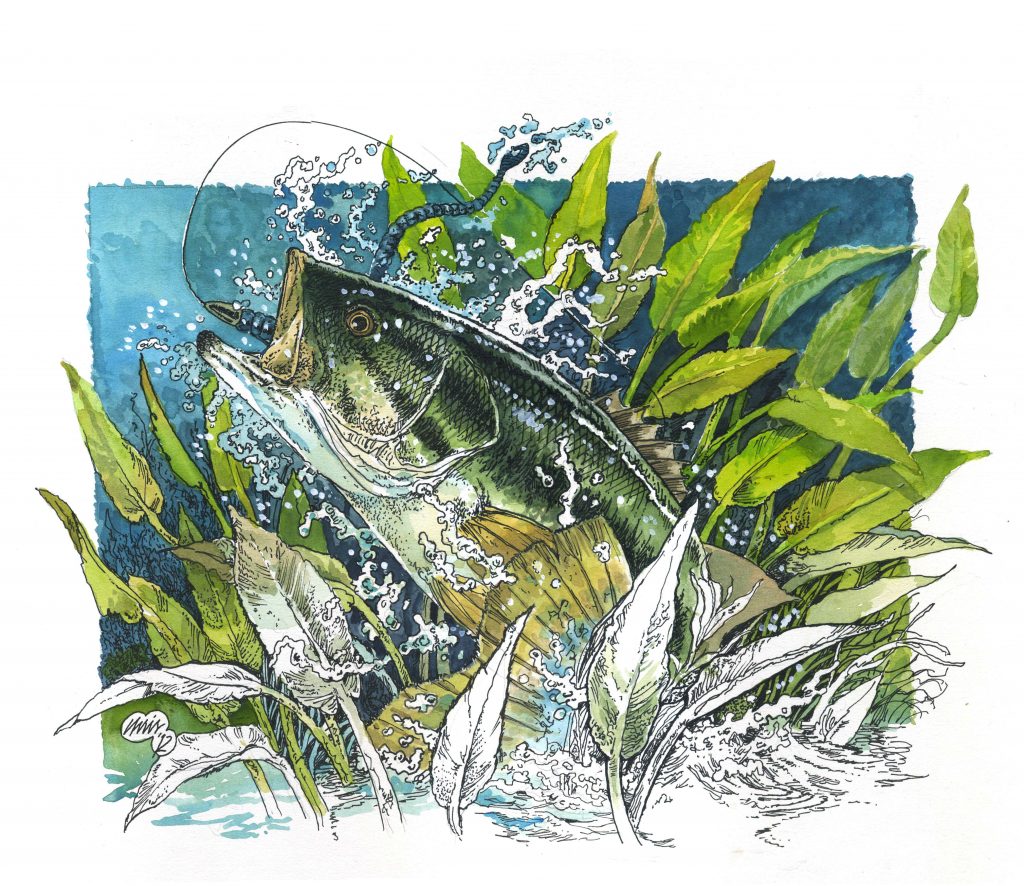
The steady work and national recognition Armstrong received through Bassmaster soon led him to end his newspaper days and open Smackwater Studios, his freelance artwork business located upstairs in his home. From Smackwater he produced countless illustrations describing the techniques, lures, and lifestyle that educated and inspired generations of anglers. In addition to Bassmaster Magazine, his work graced the pages of B.A.S.S. Times, In-Fisherman, Outdoor Life, Field & Stream, North American Fisherman, Western Outdoors, and countless others, as well as numerous books and educational materials for retailers and manufacturers.
Armstrong’s talents reached far beyond the printed page. He is responsible for an elaborate walking mural at the headquarters of the federal estuarine research reserve at Guana Tolomato Matanzas on Florida’s Atlantic Coast, as well as another for the state of Florida that details the pre-Columbian lives of American Indians who lived near Okeechobee and the world in which they lived.
Chris Armstrong died on April 23, 2014, after a lengthy illness.
